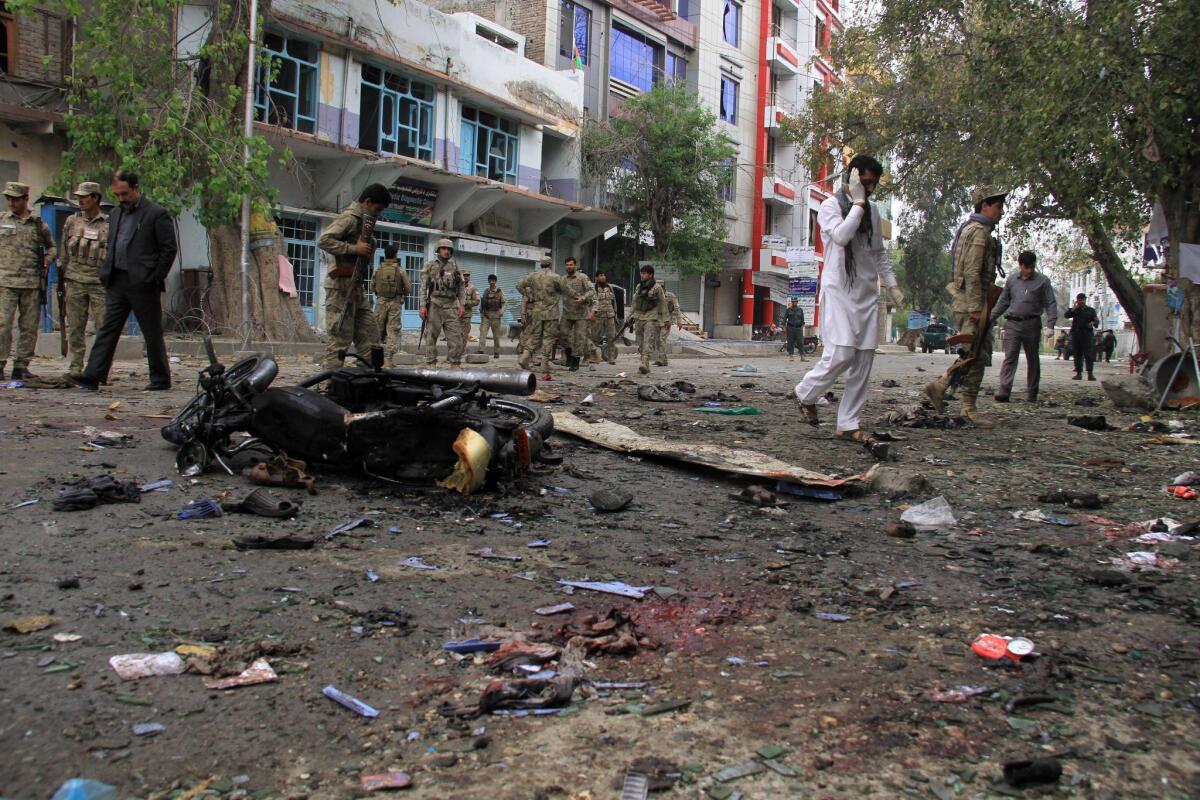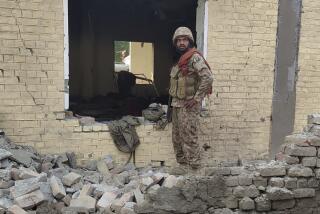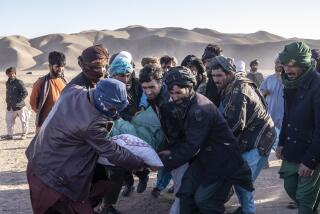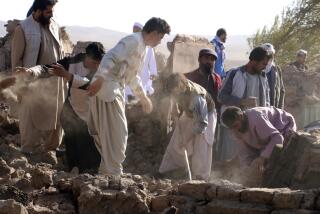At least 34 dead in Afghanistan bombing attributed to Islamic State

A suicide bombing outside a crowded bank has left at least 34 people dead and more than 120 injured in eastern Afghanistan.
If claims by the group are corroborated, Saturday’s blast could prove to be the first instance of a large, coordinated Islamic State-led attack in the country.
In the days leading up to their state visit to Washington in March, high-level officials in the government of President Ashraf Ghani had repeatedly warned that Islamic State militants were present in Afghanistan but not yet at an actionable stage.
At the time of Saturday’s attack, dozens of people -- mainly government workers and military officials collecting their salaries -- were waiting outside the bank branch in Jalalabad, the capital of Nangarhar province.
Fazel Ahmad Sherzad, Jalalabad city police chief, said at a news conference that an investigation is still underway.
“It was a suicide attack.… It is early to say what kind of suicide bomber” committed the act, said Sherzad.
A group claiming to belong to Islamic State released its own account of the attack.
Shahidullah Shahid, who said he is a spokesman for the group in Afghanistan, claimed responsibility. Images circulated online by social media accounts claiming to be allied with Islamic State purported to show the bomber standing in front of a black flag associated with the Sunni militant group that has seized large swathes of Syria and Iraq.
In a statement, President Ghani, who was on his way to Badakhshan in the extreme northeast where last week 23 members of the Afghan army died in a series of attacks, condemned the violence in Jalalabad.
Ghani condemned the bombing as a “cowardly and heinous terrorist attack on civilians.”
The Taliban, too, condemned the attack.
In a statement to the Reuters news agency, Zabiullah Mujahid, a Taliban spokesman, said: “It was an evil act. We strongly condemn it.”
Earlier reports of Islamic State presence in Afghanistan focused on rifts among the Taliban ranks that led to splits and ultimately bids to join in the larger Middle East-based militant group headed by Abu Bakr Baghdadi.
Speaking to the Los Angeles Times in March, Abdul Salam Rahimi, chief of staff to Ghani, said that if the Taliban agree to negotiations with the Afghan government he could envision a situation where they joined Kabul in fighting any Islamic State presence in Afghanistan.
In Kabul on Saturday, the parliament approved 16 candidates to head ministries and other high-level posts. The vote, marking the second attempt in four months at approving a complete candidate, failed to provide a leader for the defense ministry. But it did result in three more women being selected to help run the government, heading the ministries of women’s affairs, higher education and labor, social affairs, martyrs and disabled.
Throughout his presidential campaign last year, Ghani promised to deliver a cabinet by his first 100 days in office. However, nearly a year later, many in Afghanistan see the incomplete cabinet still filled with dozens and dozens of caretaker posts -- including high-level ministers and provincial governors -- as leading to an increased sense of insecurity and greater corruption at local levels.
Latifi is a special correspondent.
More to Read
Start your day right
Sign up for Essential California for news, features and recommendations from the L.A. Times and beyond in your inbox six days a week.
You may occasionally receive promotional content from the Los Angeles Times.






